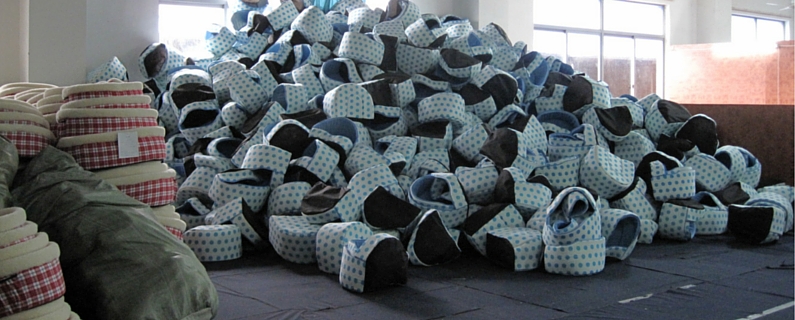What would happen if 25% of the parts you needed to manufacture your biggest selling product were delayed by one day? One week? Indefinitely? What if the delays impacted your peak sales season? What if you were not able to ship your goods at all because the materials needed for their production were never received from their manufacturers? What if the parts that were received were substandard, or even dangerous, and were unusable? I ask these questions because they represent the circumstances in which some of the international businesses with whom we work have found themselves – facing huge losses due to delays or failures in their supply chains.
US Provides A Horrible Example:
In winter 2015, a breakdown in negotiations between the United State’s largest port employers organization (the Pacific Maritime Association) and one of its largest employee unions (International Longshore and Warehouse Union) caused a lock out of workers at American port facilities. Hundreds of thousands of containers from around the world were stranded on docks up and down the American west coast. The goods they contained had been manufactured in dozens of international countries and accounted for a large percentage of American sales in all aspects of the economy. Containers filled with car parts, agricultural products and even blue jeans wasted days sitting in the sun while losses mounted for end-of-the-line industries. Agricultural exports alone were estimated to have suffered a loss of as much as US $1.75 B per month, and the North American Meat Institute estimated that industry’s loss at averaging US $85 M per week.
Thousands of the containers came from China and the delays and extra costs (of replacement supplies or alternative shipping methods, if available at all) that were suffered were especially damaging to small businesses. Some of the wholesalers and retailers that weren’t able to place their internationally sourced goods in a timely manner found their customer’s shelves stacked with their competitor’s products.
The American shipping industry strike was eventually resolved, but not before an estimated US $7 B was spent through rerouting or replacing those delayed goods, or simply to lost sales opportunities. The event underscored the negative impact of any product delivery delays or failures incurred during any phase of the production or manufacturing process.
Delays By Any Cause Can Cause Losses:
The inconsistent business practices seen across China’s manufacturing sector can create delays or failures along many manufacturing processes. While the country has implemented national-level rules and regulations regarding manufacturing standards, at the local level, those standards are not always met and are often ignored completely. In our 17+ years of assessing manufacturing risks in Asia and China, we have seen Chinese factory management teams intentionally drop one contract in order to fulfill a larger or more lucrative one that came in the door at a later time. Not phased by the impact on the first contractor, the Chinese cultural nuance often rewards the team for increasing revenue through the selective fulfillment of the second contract.
Sometimes Chinese factories will go off contract and use substandard materials in the production of the product as well. The resulting material is not just non-compliant with the contractual terms, it may also now include health or safety risks (such as the recent asbestos discovery in children’s crayons).
Prevention Is Always Best Practice:
Preventing delivery delays for any reason is best practice, obviously. In China, that best practice includes oversight throughout the life of the contract. Working with a verified and certified factory that doesn’t engage in these poor business practices should eliminate the problem altogether. Even still, western manufacturers can ensure that delays caused by poor or delayed production processes are avoided by adding timely and frequent inspections by well-trained, knowledgeable inspectors.
International producers who require timely receipt of parts and materials should take care to ensure their Chinese materials and parts suppliers are manufactured according to contract terms, and with proper manufacturing processes. While we can’t assist with such things as international labour strikes, we can assist with ensuring your Chinese factory doesn’t cause unnecessary delays in any of your production facilities. To get more details, contact us today.
To better understand how you can validate your suppliers you can also download a free checklist “New Supplier OnBoarding Checklist” here.
https://vantagecompliance.com/buying-from-china-bg/
These checkpoints are not only for new suppliers, in fact they should be checked and verified regularly for all suppliers.
This blog was written by Carsten Primdal, an independent consultant who helps businesses that have manufacturing done overseas – especially in China – minimize supply chain risk.Drawing on years of on-the-ground experience and a strong understanding of the cultural and commercial context, Carsten is passionate about helping his clients gain greater control over the risks most companies face knowingly or unknowingly.
Urgent issues? Questions? Concerns? If you are considering/already buying from Chinese factories and would like more information, please feel free to contact us for an obligation free talk.
I can be reached at carsten@vantagecompliance.com or on (+61) 413 089 020
You may also like to read some of my other blogs. They can be found here:
Reputable Chinese Suppliers Maintain China’s Industrial Reputation
China’s Economic Overhaul Will Improve Global Supply Chains
Manufacturing Compromises Can Ruin Your Brand
Tenacity and Communications Reduce Risk of Chinese Child Labour Law Violations
Safety Study Identifies Chinese Supply Factory Risks
China Manufacturing Industry Challenges Trigger Inspections, Consequences
Risk Mitigation Can Prevent Chinese Supply Chain Disruption
Tips and Traps of Contracting in China
Keeping Your Supply Chain Green: Avoiding the Environmental Polluters when sourcing in China
Ensure Timely Contract Compliance with a Chinese Supply Chain Expert
Two Key Questions To Answer Before Onboarding Your Chinese Manufacturing Supplier
Off-Shore Manufacturer’s Certificates Require Credibility
Factory Planning Principles Improve Supply Chain Quality
Mitigating Risk of Quality Fade in Overseas Manufacturing Facilities
How to Assure your “Green” Supply Chain in China
ChAFTA Opens Doors for increase in China-Australia Business relations
China Verification for Your Manufacturing Supplier Needs
Australian Industry Agreements Encourage More Chinese Factory Verifications
China Factory Verification: Check Before You Buy
Frozen berry recall highlights potential supply chain risks in offshore production



